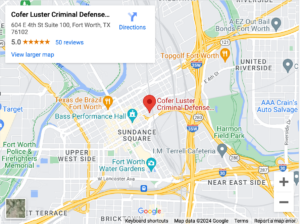
Have you been arrested or accused of domestic violence? Call Cofer Luster Criminal Defense Lawyers at (682) 777 3336 to get help from our Tarrant County domestic violence lawyers. The consequences of these charges can be immediate and long-lasting, even if a defendant isn’t ultimately convicted.
With so much at stake, you need a defense team that understands both the law and the local courts. Our Tarrant County criminal defense attorneys bring 60 years of combined experience to defending clients against family violence and related allegations across Texas.
Don’t hesitate after you’ve been charged with or accused of domestic violence in Tarrant County, Texas. Contact us today to start building your defense.
Why Choose Cofer Luster Criminal Defense Lawyers if You’re Arrested For Domestic Violence?

Domestic violence accusations in Tarrant County, TX, carry immediate risks, like restraining orders, loss of child custody, and the possibility of jail time. When your freedom and reputation are on the line, you want a legal team that brings more than just experience.
Cofer Luster Criminal Defense Lawyers sets itself apart as a team of respected legal professionals with the knowledge and experience to defend you in any situation.
Here’s why clients rely on our Tarrant County criminal defense lawyer after a domestic violence arrest:
- Backgrounds of our attorneys include experience as former prosecutors, a magistrate judge, a former federal public defender, law school faculty, and board-certified specialists in criminal law
- Hundreds of clients successfully defended
- Access to well-respected expert witnesses, private investigators, and specialists whose insight can help in all types of criminal cases
Fighting these charges without the right help is overwhelming. Our firm brings the experience and resources expected from a top criminal defense firm. Reach out to Cofer Luster Criminal Defense Lawyers to speak with a Tarrant County domestic violence attorney about your next step forward.
Overview of Domestic Violence in Texas
In Texas, domestic violence occurs when someone commits certain crimes against people with whom they have an intimate relationship. Although the state’s domestic violence statute includes separate definitions for “dating violence” and “family violence,” they may be discussed together due to their similarities.
Generally, Texas considers dating or family violence to include crimes or threats between:
- Spouses or ex-spouses
- People who share a child together, even if they’ve never lived together
- Individuals who are dating or have had a past romantic or sexual relationship
- Roommates and other people living in the same household
- Parents, children, blood relatives, or those related by adoption or marriage
- Members of your spouse’s or ex-spouse’s family
If an incident occurs between you and someone listed above, you’ll likely be charged with a domestic violence offense.
Types of Crimes That Can Become Domestic Violence Charges
A broad list of offenses may be considered domestic violence if they take place within a qualifying relationship, including:
- Assault and aggravated assault
- Threatening or intimidating another person
- Stalking or ongoing harassment
- Sexual assault and other sex crimes
- Unlawful imprisonment, including kidnapping
- Endangering a family or household member
- Interfering with custody arrangements
- Damaging the other person’s property or home
Domestic violence is not limited to physical harm. Threats, emotional abuse, and property crimes can also lead to criminal charges if they take place between people who are close or live together.
What Are the Penalties For Domestic Violence in Tarrant County, Texas?
Domestic violence charges in Tarrant County range from misdemeanors to serious felonies. Each charge brings its own punishment, and higher-level crimes or repeat offenses mean harsher consequences. Potential penalties include:
Prison
For felony domestic violence, such as those involving serious physical harm, repeat offenses, or the use of a weapon, you can be sentenced to time in a Texas state prison. You could be sentenced for many years, even decades.
Jail
Misdemeanor cases, like first-time allegations with no serious injury, are more likely to result in time in the county jail. Jail sentences can typically last up to one year. Even a short jail sentence can have a lasting effect on your life, job, and relationships.
Probation
Probation is an option that lets you serve your sentence outside of jail, but it has strict requirements. These often include counseling, random drug or alcohol testing, keeping a job, community service, and regularly reporting to a probation officer. Violating any condition can lead to a jail sentence or even result in the original prison sentence being imposed.
If the victim was pregnant at the time of the offense, 2 years will be added to the potential sentence. It’s also important to know that domestic violence convictions cannot be sealed or expunged in Texas.
Collateral Consequences of DV Charges
A DV conviction brings years of hardship beyond just jail or fines. You might have to deal with the following collateral consequences:
Barriers to Employment
Many employers routinely run criminal background checks. Domestic violence crimes are viewed especially harshly, and having this on your criminal record can mean being turned down for jobs you’re otherwise qualified for and missing out on job offers or promotions.
In some cases, professional licenses and certifications will be denied or revoked based strictly on the conviction.
Firearm Ownership Restrictions
Texas and federal law place strict limitations on your right to own or possess firearms if you have a domestic violence conviction. You may be required to surrender any guns you own and may never legally be able to purchase one in the future, leaving you at risk of new felony charges if you violate this rule.
Damaged Family Relationships and Custody Issues
A DV conviction often leads to protective orders that make it illegal to have contact with certain family members, including children. Courts frequently see these charges as evidence that parenting time or shared custody might be unsafe.
Long-Lasting Social Stigma
The mark of domestic violence sticks with you far beyond legal consequences. Friends and neighbors might view you differently. Community standing, social networks, and opportunities to participate in church or school events can all be disrupted, impacting your sense of belonging.
Immigration Problems and Deportation Risk
For non-citizens, even one conviction for domestic violence is considered serious. You risk losing your green card or other legal status, the government may cancel student or work visas, and immigration authorities can open removal proceedings against you.
If you’re facing these allegations, it’s essential to speak with a family violence lawyer right away.
What Defenses Can Be Raised if I’m Arrested for Domestic Violence?
If you’re facing domestic violence charges, it’s natural to feel overwhelmed or like you don’t know where to turn. That doesn’t mean you don’t have ways to defend yourself.
Every domestic violence case is different, and different defenses can work depending on the facts. Here are some strategies that may apply:
Self-Defense
Sometimes, force is used only to protect yourself from real and immediate danger. If you acted only out of self-protection, didn’t start the conflict, and responded with reasonable force to a threat, you may be able to successfully raise self-defense and avoid conviction.
False Allegations
Not everyone accused of family violence actually committed the alleged actions. In divorce or custody battles, parties might make up claims to gain an advantage, get back at someone, or create sympathy. Proving this can involve obtaining text messages, emails, social media posts, or the testimony of friends and family who notice inconsistencies.
Lack of Evidence
Prosecutors have to prove their case beyond a reasonable doubt. If there’s insufficient evidence—missing records, unreliable statements, or uncertainty about what truly happened—your lawyer can highlight these weaknesses to the court to argue for a not guilty verdict.
Accident
Not every injury in a domestic incident is the result of intentional harm. Sometimes someone gets hurt by pure chance, like a slip on a wet floor or an unintentional bump during an argument. If the facts show that what happened was really an accident, not an act of violence, it could lead to an acquittal.
No Visible Injuries
In some family violence cases, the absence of injury can make the story of violence look less believable. A lack of police photos or reports from doctors can go a long way in weakening the allegations.
Domestic violence accusations are always incredibly serious, requiring knowledgeable legal representation to fight back. Make sure you work with a domestic violence attorney who takes the time to listen to your side of what happened and considers every angle when building a defense.
Contact Our Tarrant County Domestic Violence Lawyer for Help with Your Case
Navigating a domestic violence charge can feel overwhelming, but you don’t have to go through it without legal support. We’ve spent decades helping people protect their rights and avoid damaging convictions.
If you’re ready to discuss your case and explore all your options, reach out to our team to set up a confidential consultation. Contact Cofer Luster Criminal Defense Lawyers to get help from a Tarrant County domestic violence lawyer.

